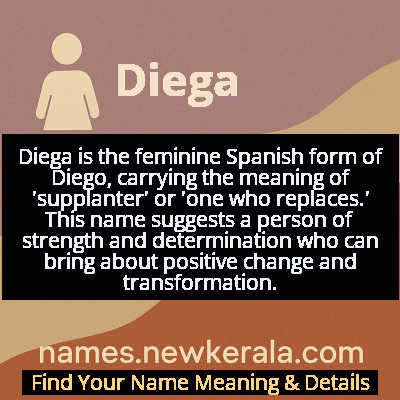Diega Name Meaning & Details
Origin, Popularity, Numerology Analysis & Name Meaning of Diega
Discover the origin, meaning, and cultural significance of the name DIEGA. Delve into its historical roots and explore the lasting impact it has had on communities and traditions.
Name
Diega
Gender
Female
Origin
Spanish
Lucky Number
8
Meaning of the Name - Diega
Diega is the feminine Spanish form of Diego, carrying the meaning of 'supplanter' or 'one who replaces.' This name suggests a person of strength and determination who can bring about positive change and transformation.
Diega - Complete Numerology Analysis
Your Numerology Number
Based on Pythagorean Numerology System
Ruling Planet
Saturn
Positive Nature
Ambitious, efficient, realistic, and authoritative.
Negative Traits
Materialistic, stressed, confrontational, and can be overly ambitious.
Lucky Colours
Dark blue, black.
Lucky Days
Saturday.
Lucky Stones
Blue sapphire, amethyst.
Harmony Numbers
2, 4, 6.
Best Suited Professions
Business leaders, managers, financial services, law enforcement.
What People Like About You
Leadership, determination, organizational skills.
Famous People Named Diega
Diega de Cárdenas
Noblewoman and patron
Prominent Spanish noblewoman known for her patronage of religious institutions and cultural preservation
Diega Camacho
Educator and feminist
Pioneering Spanish educator who advocated for women's education rights in rural Spain
Diega Fernández
Artist
Contemporary Spanish painter known for vibrant depictions of Andalusian culture and feminist themes
Name Variations & International Equivalents
Click on blue names to explore their detailed meanings. Gray names with will be available soon.
Cultural & Historical Significance
During the colonial era, the name spread to Latin America, where it became symbolic of Spanish heritage and cultural identity. In modern times, Diega represents a connection to traditional Spanish values while embracing contemporary femininity, serving as a bridge between historical legacy and modern womanhood in Spanish-speaking communities worldwide. The name embodies the complex history of Spanish femininity - both the traditional roles women have played in preserving culture and the progressive steps toward gender equality in Spanish-speaking societies.
Extended Personality Analysis
Women named Diega are typically perceived as strong-willed, determined individuals with a natural leadership quality. They often exhibit the 'supplanter' characteristic inherent in the name's meaning, showing resilience and the ability to overcome challenges through strategic thinking and perseverance. Diegas are known for their loyalty to family and tradition, yet they possess an independent spirit that allows them to adapt to changing circumstances. Their personality often blends traditional values with modern perspectives, creating a unique balance of respect for heritage and openness to innovation.
In social settings, Diegas are often charismatic and influential, with a natural ability to inspire others while maintaining their authentic identity. They tend to be protective of those they care about and demonstrate remarkable emotional strength during difficult times, embodying the historical strength associated with their name's origins. This combination of traditional grounding and modern adaptability makes Diegas particularly effective in roles that require both cultural sensitivity and progressive thinking. Their inherent determination often leads them to achieve significant personal and professional accomplishments through persistent effort and strategic planning.
Modern Usage & Popularity
In contemporary times, Diega maintains a steady but relatively rare usage compared to its masculine counterpart Diego. The name is experiencing a mild resurgence among Spanish-speaking families seeking traditional yet distinctive names for daughters. While not among the most popular names in Spain or Latin America, it holds appeal for parents wanting to honor family traditions while giving their daughter a name with historical depth. In the United States and other English-speaking countries, Diega remains uncommon but is occasionally chosen by families with Spanish heritage. The name's usage patterns show it's more frequently selected by educated, middle-class families who value cultural heritage and want a name that stands out without being overly exotic. Recent years have seen increased interest in traditional Spanish feminine names, potentially signaling growing appreciation for Diega's unique charm and historical significance.
Symbolic & Spiritual Meanings
Symbolically, Diega represents transformation and replacement in a positive sense - the idea of one thing making way for something better, much like the seasons change or a caterpillar becomes a butterfly. The name carries connotations of strength through adaptation and the wisdom to know when change is necessary. In metaphorical terms, Diega symbolizes the bridge between tradition and progress, embodying the ability to honor the past while embracing the future. The name also represents feminine power within cultural contexts, suggesting a woman who can maintain her identity while navigating different roles and expectations. In spiritual symbolism, Diega connects to the concept of divine timing and the understanding that every ending makes space for new beginnings, reflecting the supplanter meaning in its most positive interpretation as someone who brings necessary change and renewal.

